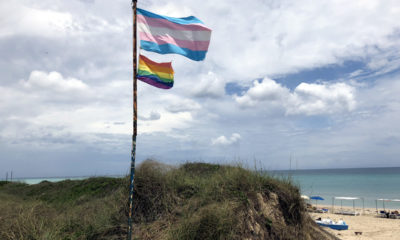Living
We’ll have a gay ‘ole time
LGBT-specific travel options abound throughout 2016


Winter Party Miami, in early March, promises endless gay parties in a balmy Florida setting. (Photo courtesy the event)
As winter starts packing on the snow, trade the shovel for skis at some of the best gay ski weeks.
Had enough of the powder? Then head to Louisiana for a gay Mardi Gras experience, try wine tasting in Napa or even a multi-island cruise for lesbians.
Pride comes early this year in Philly, and Miami’s Winter Party is a short flight away from the Washington area. Winter blues shouldn’t keep you in the house — get out and explore some of these upcoming LGBT-centric events.
Napa Valley, Calif.
What warms the body more than a little wine? The Napa Valley Wine Train hosts its inaugural Pride Ride on March 19. This LGBT event offers guests a chance to enjoy a special dinner featuring some of the Bay Area’s most prominent LGBT wine experts, each on hand to lend their expertise and assist guests in selecting wines to specially pair with their four-course gourmet meal created by Napa Valley Wine Train Executive Chef Kelly Macdonald.
Telluride, Colo.
Hit the powder at Telluride Gay Ski Week, in its first year as a locally produced event, taking place Feb. 20-27. This year presents an impressive list of special guests, including Olympian Gus Kenworthy, musician Shawn Colvin, comedian Sandra Bernhard and the infamous DJ Ruckus, among others. The week will be packed with events like a dance party at Gorrono Beach on the Telluride Ski Resort, opening cocktail party at Arroyo Gallery and wine bar/pop-up night club at La Marmotte, White Party and the Après Ski Pool Party at Madeline Sky Terrace, where DJ Soul Atomic will spin.
New Orleans
Famous for their huge Carnival celebrations, rowdy Bourbon Street crowds, and French, Spanish, and Native American influences, Mardi Gras is one of the most anticipated annual celebrations in America. The 67th annual Gay Mardi Gras kicks off on Saturday, Jan. 30th with the Krewe of Amon-Ra 51st annual Mardi Gras Ball. The celebrations continue on into early February with the Friday Night Before Mardi Gras Extravaganza XVII on Friday, Feb. 5. There are back-to-back masked balls on Saturday, Feb. 6 (8 p.m., Krewe of Armeinius Bal Masque XLVIII, Frederick J. Sigur Civic Center, Chalmette, La.) and on Sunday, Feb. 7th (8 p.m., Lords of Leather Bal Masque XXXIII, John A. Alario, Sr. Event Center, Westwego, La.). Everyone is welcome, gay and straight during the Mardi Gras (Fat Tuesday) event on Tuesday, Feb. 9.
Palm Springs, Calif.
For the fur-loving community, head to the desert for the International Bear Convergence Feb. 4-8 at the Hard Rock Hotel Palm Springs for the premier winter event for bears and admirers. This desert oasis opens its arms and welcomes you to the hip Hard Rock Hotel Palm Springs to thousands of frisky, furry bears, their friends and fans. The four-day event will come to life with DJs, live entertainment and thousands of bears from around the globe. The last two years were hugely successful and more of the same is expected in 2016.
Philadelphia
To get a head start on your yearly Pride rotations, head to Philly for the Philadelphia Black Gay Pride festvities. The spring event will take place April 28-May 1. The mission is to transform the living and social environments of LGBT people of color. Over five days, Philadelphia Black Gay Pride entertains and inspires with open-mic spoken word, awards, parties and much more happening at venues all over the city. More details to come.
Winter Party Miami
Surround yourself with miles of white sandy beaches, thousands of men in speedos and weekend fiestas at Winter Party in Miami March 2-7. The event starts with mega party Ignite, and on Friday, the Pulse party goes all night and all morning to finally end at 7 a.m. Saturday brings the Under One Sun pool party, followed by the Beach Party on Sunday. There will be a dance floor, pavilions, DJ booth, tents for relaxing, drinking and chatting sprawl along South Beach’s Lummus Park.
Caribbean Escape
Olivia’s Caribbean Escape Cruise starts this weekend and runs Jan. 30-Feb. 6. The cruise will give women the opportunity to join 1,900 lesbians on the Holland America’s MS Westerdam. The itinerary is jam packed with snorkeling, deep-sea fishing and kayaking excursions. Soak up the sunshine on four different islands, including Turks & Caicos, Puerto Rico, St. Thomas, and the Bahamas. From relaxing and lounging on beautiful Caribbean beaches, to a visit to a Bacardi Distillery, there is something for everyone. Olivia has several cruises planned throughout the year including Lisbon to Dublin (June 26-July 4), Dublin to Edinburgh (July 4-12), Tahiti (Aug. 20-27), Pacific Coast (Sept. 25-Oct. 2), Windward Islands (Dec. 2-9) and more into 2017.
Manchester, UK
Looking to travel to Europe this winter? Check out Manchester, UK, home to a thriving arts and culture scene and the renowned Manchester International Festival. During LGBT History Month in February, Manchester hosts the eighth annual Queer Contact Festival, an art “explosion” that runs from Feb. 4-14 and features a 10-day lineup of theater, music, dance, cabaret, comedy, spoken word and visual art performances. Expect international artists like Erasure’s Andy Bell, U.S. transgender performers and activists Kate Bornstein, Our Lady J, poet Jackie Kay and visual artists AL and AL.
Cuba welcomes gays despite embargo
By MICHAEL K. LAVERS
The restoration of diplomatic relations between the U.S. and Cuba has sparked renewed interest in LGBT travel to the Communist island.
Congress has yet to lift the embargo that prevents U.S. citizens for traveling to Cuba for tourism-specific activities. Yet there are several attractions in Havana for the LGBT traveler who may find themselves on the island.
Humboldt 52, a gay bar near the iconic Hotel Nacional, is popular with Cubans and foreigners alike. The nearby Cabaret Las Vegas features drag shows and other performances.
La Guarida, the restaurant in the 1993 film “Fresa y Chocolate” that features a student and a gay artist who is dissatisfied with then-Cuban President Fidel Castro’s government, is located near Havana’s Chinatown.
A portion of the Cuban capital’s oceanfront promenade near the Hotel Nacional is a popular late-night gathering place for LGBT Cubans. Mi Cayito is a gay beach located east of Havana capital.
Supporters of Mariela Castro, daughter of President Raúl Castro, who directs Cuba’s National Center for Sexual Education that is known by the Spanish acronym CENESEX, have credited her with advancing LGBT issues on the island.
A member of Cuban Parliament, she supports marriage rights for same-sex couples.
CENESEX each May organizes a series of events in Havana and across the country that commemorates the International Day Against Homophobia and Transphobia.
Transgender people have been able to obtain free sex-reassignment surgery under the island’s national health care system since 2008. Mariela Castro in 2013 voted against a proposal that banned anti-gay discrimination in the workplace because it did not include gender identity.
Fidel Castro told a Mexican newspaper in 2010 that sending gay men to work camps in the years after the Cuban Revolution was a “great injustice.” Independent LGBT rights advocates say they continue to face discrimination and harassment from the island’s government.
Real Estate
The world’s on fire and D.C. is on sale (sort of)
Prices are up, but then again, nothing makes sense anymore

ICE is disappearing people, revered government agencies are shuttering, and who knows if we’ll be in World War III next week? But can you believe prices in D.C. are actually still up 6.3% since last year? It doesn’t make sense, and perhaps that does make sense, because nothing seems to make any sense any more.
That said, there are some parts of our market that are truly suffering. The interest rates, which have been up, up, up for about four years now, are the ongoing rain on our market’s military parade. Combine that with 75,000 federal employees taking a buyout nationwide, and DOGE cuts eliminating around 40,000 federal jobs in the District (per estimates by the D.C. CFO), not to mention thousands of other job losses in non-governmental organizations due to funding and program cuts, and you’ve got a case of uncertainty, and downright unaffordability in the pool of otherwise would-be buyers.
This has had a marked impact on properties that starter-home buyers and low- to mid-level employees would otherwise buy, most notably condominium and cooperative apartment units. These properties have already slowed in our market thanks to the profound impact that higher interest rates have had on their monthly carrying costs—pair that with job insecurity, and a lot of condos are proving to be very difficult to sell indeed.
So how is the average sale price up in our market?
The increase is almost entirely due to the resounding strength of the single-family home market, especially in upper Northwest D.C., where it is still quite common to see bidding wars, even on properties pushing past the $3M mark. It seems that buyers in that echelon are less impacted by a few percentage points in the interest rate, and less concerned about their job security. Notably, those buyers are often married with children and have an absolute need for more space, must stay in the area due to one spouse’s job, or the kid’s friend group, regardless of whether the cost of owning is thousands of dollars more per month than it would have been in 2020 or 2021. The continued appreciation in these neighborhoods defies imagination.
So, what to do if you are not one of those lucky enough to be shopping for a $3M home? The short answer: wait. If you want more space, rent your current place out and learn the joys of being a landlord while someone else pays your mortgage. Need the equity from your current home to buy your next place? Get a home equity line of credit, or loan, and pull the equity out of your current place to buy the next one. Or—and I have never recommended this before in 21 years of being a Realtor—rent for a few years. Sure, I’d love to list and sell your condo so you can climb the real estate ladder, but it might just be a waste of time, money or both if you could just ride out this storm and sell in a DOGE-less future.
All this said, there are some condos that seem to be immune from this recent negative news. Anecdotally, it feels like it’s the truly special ones that do just fine no matter the market. Our recent listing in Capitol Hill had a view from every one of its 15 windows of the Supreme Court. Sold in five days with six offers. Another condo was on the top two floors of a townhouse and had the coolest black wood floors that gleamed like a grand piano. Sold in four days at full price.
So, all is not for naught if you have a condo or home in an area that people want to be in, with nice space, light, amenities and a certain je ne sais quois. And, as long as we have a democracy in a few years, my experience says our market will be back, stronger than ever, really soon.
David Bediz is a Realtor and mortgage loan broker for the Bediz Group LLC and Home Starts Here, LLC. Reach him at [email protected].

In this corner, there’s the Genesis QV70, newly updated and full of glitzy gizmos. And in the opposing corner, there’s the Lexus NX, a fan fave known for comfort and reliability.
Both are strong contenders. Both have proven to be equally adept at bobbing and weaving through traffic. And both can go toe to toe with pricier competitors.
And yet, what would happen when they sparred against each other? Here’s your ringside seat to find out.
GENESIS QV70

$50,000
MPG: 22 city/28 highway
0 to 60 mph: 5.9 seconds
Cargo space: 28.9 cu. ft.
PROS: Stylish. Good value. Lots of standard amenities.
CONS: So-so fuel economy. Quirky dash controls.
IN A NUTSHELL: When it comes to speed, the Genesis QV70 is faster on its feet than the Lexus NX. Neither of these crossover SUVs is a lightweight, but the QV70 offers more potent powerplants—including an all-electric version that zips from 0 to 60 mph in just 3.8 seconds. In other words, Porsche Macan S territory.
The two gas-powered options—a four-cylinder turbo and twin-turbo V6—also got my blood pumping. So did the velvetlike suspension mixed with deft handling and stop-on-a-dime braking. But this adrenaline rush comes at a cost: sacrificing fuel economy.
As for the automaker’s design philosophy—“athletic elegance”—it’s on full display here: an oversized grille inspired by the Genesis emblem, the dramatically arcing silhouette, and those distinct quad headlights and taillights. It’s not easy to stand out when 25% of all vehicles sold in the U.S. are compact crossovers, so kudos to the QV70 for being such a head-turner.
The mod-yet-minimalist styling carries over to the cabin, with its high-quality materials: real-wood accents, soft-touch plastics and a tasteful glass shift knob. New this year is a sweeping 27-inch dashboard monitor, which houses the gauge cluster and infotainment touchscreen. Alas, this display is positioned a bit far from the driver (though I must admit reaching for it did help stretch a few tight back muscles).
Instead of being a costly extra, this gigantic monitor comes standard. So do synthetic leathers seats, nine-speaker stereo, smartphone/wireless connectivity, hands-free liftgate, tons of safety gear and more. Options include a panoramic sunroof, three-zone climate control, 16-speaker Bang & Olufsen audio, synthetic suede headliner, sound-reducing rear windows, automated parking and other goodies.
What’s the score so far? Despite some minor quibbles, the Genesis QV70 is a worthy challenger that pulls no punches.
LEXUS NX

$43,000
MPG: 26 city/33 highway
0 to 60 mph: 8.2 seconds
Cargo space: 22.7 cu. ft.
PROS: Fuel efficient. Comfy seats. Rock-solid reliability.
CONS: Pokey base model. Limited rear storage.
IN A NUTSHELL: Sure, the Lexus NX isn’t as speedy as the Genesis QV70. But, as with the tortoise and the hare, sometimes slow and steady wins the race. And really, it’s only the entry-level NX that feels sluggish, such as when trying to quickly merge into freeway traffic.
Other trim levels, including two hybrid options, are just fine. And no matter the engine choice, the counterpunch here is that these vehicles get better gas mileage: 20% higher fuel economy than in either the four-cylinder or V6 in the Genesis. The two NX hybrids are even more green, with the high-end plug-in version able to travel up to 37 miles on electric power alone. One downside: There is no all-electric NX—well, at least not yet.
As with parent-company Toyota, Lexus offers stellar vehicle reliability—often ranked No. 1 in dependability and crash-test surveys year after year. Lexus vehicles generally hold their value better than Genesis, because this newer brand has a shorter history. Lexus also has a larger dealer network, though the number of Genesis dealerships is growing.
But when it comes to cargo space, the NX is about two inches shorter and narrower than the QV70, which has more stowage area. And Genesis handling is sportier, though the Lexus feels sure and well-grounded.
Luxe interior amenities are basically the same in both vehicles. But interior styling in the QV70 is trendy, while the NX is more understated. In other words, a choice between sassy and classy.
This is a very competitive vehicle segment, with Euro models like the Audi Q5, BMW X3 and Mercedes GLC also duking it out in what seems like a clash of the titans.
But as for the Genesis QX70 or Lexus NX, which is the winner? For me, both are real knockouts—so I’d call it a draw.
Real Estate
No Rose, your interest rate has nothing to do with how many likes you got on Hinge
Many factors help determine rates these days

Picture it, you’re sitting in the lunchroom at work, and your coworker just bought a house. Another coworker bought one a few months ago and you hear that she got a totally different interest rate than the other one did, even though they both bought houses not that far from each other. Homebuyers everywhere have been wondering what interest rates they are going to get, lately. It’s easy to read an article online or see an ad on social media stating specific numbers, but there may be more than meets the eye going into a particular buyer’s interest rate.
What are the factors that can affect the interest rate a buyer eventually “locks in”?
- Property details – certain properties may be in neighborhoods with higher rates of foreclosure, or there may be specific census tracts that allow a buyer to participate in the “Fannie Mae Home Ready” and “Freddie Mac Home Possible” programs, which carry more flexible requirements such as various income limits and lower interest rates, to help people begin homeownership.
- Type of loan / loan amount– a conventional, conforming loan or a jumbo loan can have differing interest rates, as well as FHA loans.
- Credit score – most people are aware that this affects what interest rate is quoted, just like on a credit card. Some lenders will work with you on ways to improve a credit score if the goal is to buy six, nine, or 12 months from now.
- Lock period – do you want to lock in the rate for 30 days? 45? Market volatility can cause the rates to change so it will cost more money to hold onto a particular interest rate.
- Loan to value ratio – one can still buy a home with less than 20% down, but the rate that is quoted may be higher.
- Occupancy type – is this the primary residence or an investment property?
- Points bought or credits taken – A buyer can pay the lender a fee to buy down the interest rate, or the seller can sometimes offer a credit. This has become more popular in recent years.
- Market conditions – keep an eye on the news – as we are all aware, change is the only constant!
Lender Tina del Casale with Atlantic Union Bank says, “With jumbo fixed rates in the low 6’s, and first-time buyer down payment assistance loans such as DC Open Doors, rates are in the mid 7’s. With the added factors of your income, the address you are purchasing and your credit score factoring into the equation, interest rates are different from buyer to buyer these days. So, skip the online tools and make a few calls because that’s the only way to get an accurate quote these days!”
It might feel like an overwhelming amount of information to take on, but remember, there are people that help others take these big steps every day. A trusted lender and Realtor can guide their clients from start to finish when it comes to purchasing a home. And for that, you’ll be saying, “thank you for being a friend!”
Joseph Hudson is a referral agent with Metro Referrals. Reach him at 703-587-0597 or [email protected].




















